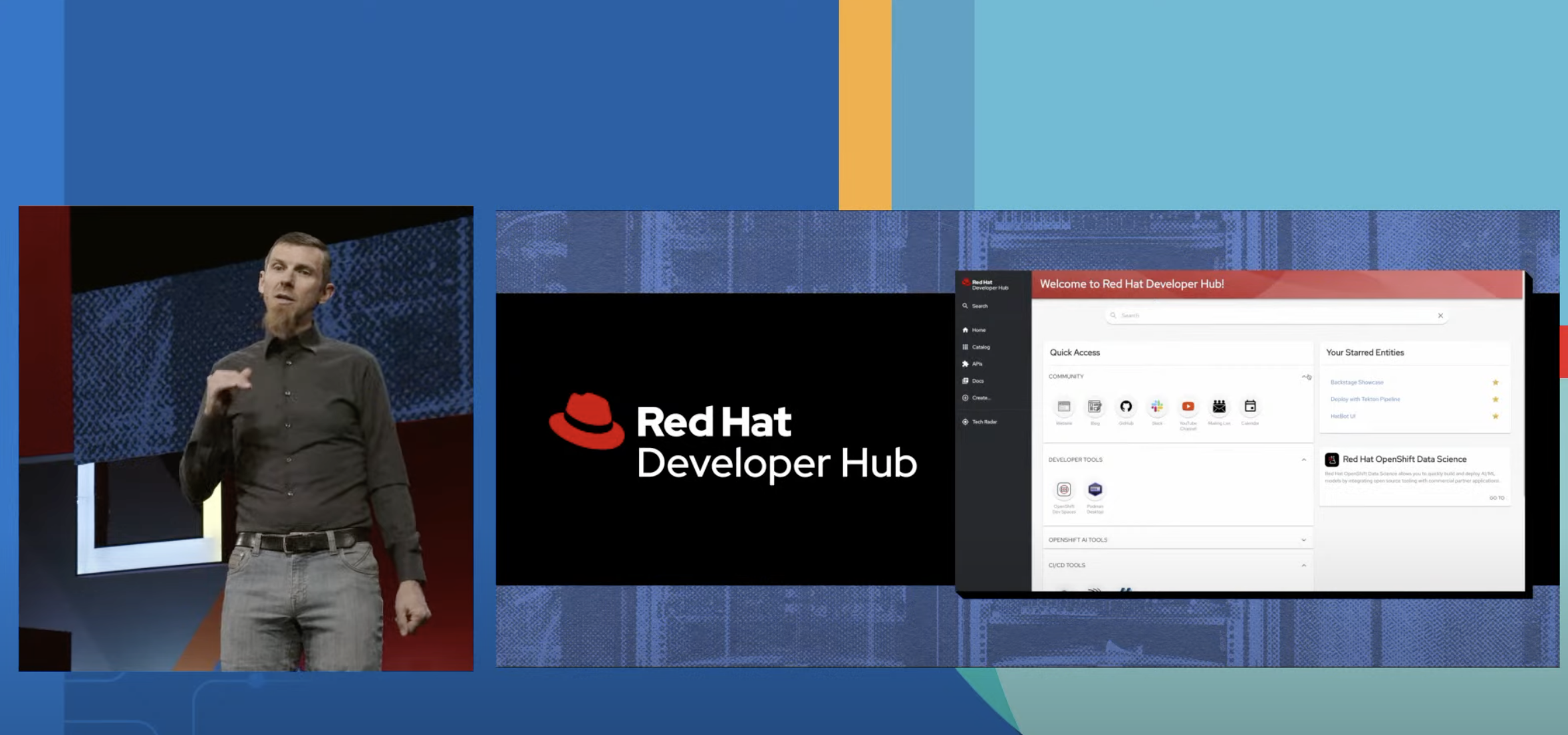Red Hat Developer Hub aims to help developers build better apps faster
The portal was built to standardize the developer experience while maximizing the return on existing investments


Red Hat has unveiled its Red Hat Developer Hub as a fully-fledged portal to ‘supercharge’ the developer experience.
The product is a former open source project from Cloud Native Computing Foundation (CNCF), called Backstage.io, and is now the first standalone, enterprise-grade version of it.
Red Hat Developer Hub, according to the open source software firm, unifies and standardizes the developer experience, maximizes productivity, and enables individuals and organizations to make the most of existing investments and skill sets.
The new portal - unveiled at this week’s Red Hat Summit in Boston - is unified and open, and essentially offers developers an internally curated and managed toolset to ensure they can quickly and easily turn their software visions into successful reality.
It’s all about maximizing what enterprises have already invested in at a knowledge and financial level as well as increasing velocity and reducing friction, the company claimed.
“This helps developers focus on crafting beautiful code and not the plumbing underneath"
Chris Wright, CTO at Red Hat
“Red Hat Developer Hub adds support for key Red Hat developer plug-ins to drive a more consistent user experience without compromising on that application velocity. The platform also contains validated templates," said Chris Wright, CTO at Red Hat.
"These provide opinionated, pre-architected approaches to building and deploying software from creation to production.
Sign up today and you will receive a free copy of our Future Focus 2025 report - the leading guidance on AI, cybersecurity and other IT challenges as per 700+ senior executives
“Developer Hub gives IT organizations a developer platform built on open source innovation with that stability, that support, that reliability that you’ve come to expect from our hybrid cloud technologies. Developer Hub also builds on skills that IT organizations have already through integration with Red Hat OpenShift.
“That’s the best news. It’s building on skills and technologies that you already have. This maximizes what you know without having to sacrifice application innovation to maintain operations.”
RELATED RESOURCE

Designing the ideal digital work experience for the next generation of innovators
What users want, why it's critical to give it to them, and how the whole organization can benefit
Wright also cited Salesforce’s 2022 ‘Great Resignation’ research, which revealed the majority (76%) of firms feel the cognitive load needed to get to grips with new software architectures is just too high.
As a result, productivity and sense of achievement decrease rather than increase.
Developer Hub aims to redress the balance here, according to Wright.
“As IT resources grow ever more scant and demand for new applications just keeps growing, these platforms grow more daunting. If these platforms aren’t maintained at the speed of development, then CIOs can look forward to fragmentation, complexity, and worse. The use of unverified code that can find its way into production…
“Adding a net new platform all but guarantees a new learning curve, which equates to hours lost in training that you really don’t have.”
With a view to removing barriers and accelerating innovation and results-driven performance, the Red Hat Developer Hub:
- Offers a single view of all the tools and resources available for developers as they look to boost productivity.
- Enables users to self-serve and ensure best practice across the board.
- Maintains the proper levels of security and governance.
Wright said that the focus was on taking “differentiated applications to market as quickly and as painlessly as you can".
What’s more, Wright acknowledged the unsung IT heroes outside of the developer world, saying it was those people that kept “developer workflows rolling smoothly, with the right tools, the validated environments, and on-demand services".
Ultimately, Developer Hub should free up developer bandwidth in a number of ways.
“This helps developers focus on crafting beautiful code and not the plumbing underneath,” Wright added.
Maggie has been a journalist since 1999, starting her career as an editorial assistant on then-weekly magazine Computing, before working her way up to senior reporter level. In 2006, just weeks before ITPro was launched, Maggie joined Dennis Publishing as a reporter. Having worked her way up to editor of ITPro, she was appointed group editor of CloudPro and ITPro in April 2012. She became the editorial director and took responsibility for ChannelPro, in 2016.
Her areas of particular interest, aside from cloud, include management and C-level issues, the business value of technology, green and environmental issues and careers to name but a few.
-
 ‘1 engineer, 1 month, 1 million lines of code’: Microsoft wants to replace C and C++ code with Rust by 2030 – but a senior engineer insists the company has no plans on using AI to rewrite Windows source code
‘1 engineer, 1 month, 1 million lines of code’: Microsoft wants to replace C and C++ code with Rust by 2030 – but a senior engineer insists the company has no plans on using AI to rewrite Windows source codeNews Windows won’t be rewritten in Rust using AI, according to a senior Microsoft engineer, but the company still has bold plans for embracing the popular programming language
-
 AWS says ‘frontier agents’ are here – and they’re going to transform software development
AWS says ‘frontier agents’ are here – and they’re going to transform software developmentNews A new class of AI agents promises days of autonomous work and added safety checks
-
 Google CEO Sundar Pichai thinks software development is 'exciting again' thanks to vibe coding — but developers might disagree
Google CEO Sundar Pichai thinks software development is 'exciting again' thanks to vibe coding — but developers might disagreeNews Google CEO Sundar Pichai claims software development has become “exciting again” since the rise of vibe coding, but some devs are still on the fence about using AI to code.
-
 Google Brain founder Andrew Ng thinks everyone should learn programming with ‘vibe coding’ tools – industry experts say that’s probably a bad idea
Google Brain founder Andrew Ng thinks everyone should learn programming with ‘vibe coding’ tools – industry experts say that’s probably a bad ideaNews Vibe coding might help lower the barrier to entry for non-technical individuals, but users risk skipping vital learning curves, experts warn.
-
 Red Hat eyes tighter data controls with sovereign support for EU customers
Red Hat eyes tighter data controls with sovereign support for EU customersNews The company's new offering will see support delivered entirely by EU citizens in the region
-
 Red Hat eyes developer workflow efficiency, app modernization gains with new AI tools
Red Hat eyes developer workflow efficiency, app modernization gains with new AI toolsNews An AI assistant specifically designed for application migration and modernization looks to reduce developer toil
-
 Anthropic’s new Claude Code web portal aims to make AI coding even more accessible
Anthropic’s new Claude Code web portal aims to make AI coding even more accessibleNews Claude Code for web runs entirely in a user’s browser of choice rather than in a command-line interface and can be connected directly to chosen GitHub repositories.
-
 The UK’s aging developer workforce needs a ‘steady pipeline’ of talent to meet future demand – but AI’s impact on entry-level jobs and changing skills requirements mean it could be fighting an uphill battle
The UK’s aging developer workforce needs a ‘steady pipeline’ of talent to meet future demand – but AI’s impact on entry-level jobs and changing skills requirements mean it could be fighting an uphill battleAnalysis With the average age of developers in the UK rising, concerns are growing about the flow of talent into the sector


